
Baron Vladimir Harkonnen is a fictional character in the Dune franchise created by Frank Herbert. He is primarily featured in the 1965 novel Dune and is also a prominent character in the Prelude to Dune prequel trilogy (1999–2001) by Herbert's son Brian and Kevin J. Anderson. The character is brought back as a ghola in the Herbert/Anderson sequels which conclude the original series, Hunters of Dune (2006) and Sandworms of Dune (2007).

Paul Atreides is a fictional character in the Dune universe created by Frank Herbert. He is a main character in the first two novels in the series, Dune (1965) and Dune Messiah (1969), and returns in Children of Dune (1976). The character is brought back as two different gholas in the Brian Herbert/Kevin J. Anderson novels which conclude the original series, Hunters of Dune (2006) and Sandworms of Dune (2007), and appears in the prequels Paul of Dune (2008) and The Winds of Dune (2009). According to Brian Herbert, Frank Herbert's son and biographer, House Atreides was based on the heroic but ill-fated Greek mythological house of Atreus.

Dune is a 1984 American epic space opera film written and directed by David Lynch and based on the 1965 Frank Herbert novel Dune. It was filmed at the Churubusco Studios in Mexico City. The soundtrack was composed by the rock band Toto, with a contribution from Brian Eno. Its large ensemble cast includes Kyle MacLachlan's film debut as young nobleman Paul Atreides, Patrick Stewart, Brad Dourif, Dean Stockwell, Virginia Madsen, José Ferrer, Sean Young, Sting, Linda Hunt, and Max von Sydow.

Dune is a 1965 epic science fiction novel by American author Frank Herbert, originally published as two separate serials in Analog magazine. It tied with Roger Zelazny's This Immortal for the Hugo Award for Best Novel and won the inaugural Nebula Award for Best Novel in 1966. It is the first installment of the Dune Chronicles. It is one of the world's best-selling science fiction novels.

The Fremen are a group of people in the fictional Dune universe created by Frank Herbert. First appearing in the 1965 novel Dune, the Fremen inhabit the desert planet Arrakis, which is the sole known source in the universe of the all-important spice melange. Long overlooked by the rest of the Imperium and considered backward savages, in reality they are an extremely hardy people and exist in large numbers. The Fremen had come to the planet thousands of years before the events of the novel as the Zensunni Wanderers, a religious sect in retreat. As humans in extremis, over time they adapted their culture and way of life to survive and thrive in the incredibly harsh conditions of Arrakis. The Fremen are distinguished by their fierce fighting abilities and adeptness at survival in these conditions. With water being such a rare commodity on the planet, their culture revolves around its preservation and conservation. Herbert based Fremen culture, in part, on the desert-dwelling Bedouin and San People.
Arrakis —informally known as Dune and later called Rakis—is a fictional desert planet featured in the Dune series of novels by Frank Herbert. Herbert's first novel in the series, 1965's Dune, is considered one of the greatest science fiction novels of all time, and it is sometimes cited as the best-selling science fiction novel in history.

Alia Atreides is a fictional character in the Dune universe created by Frank Herbert. She was introduced in the first novel of the series, 1965's Dune, and was originally killed in Herbert's first version of the manuscript. At the suggestion of Analog magazine editor John Campbell, Herbert kept her alive in the final draft. Alia would next appear as a main character in both Dune Messiah (1969) and Children of Dune (1976). The character is brought back as a ghola in the Brian Herbert/Kevin J. Anderson conclusion to the original series, Sandworms of Dune (2007).

A sandworm is a fictional extraterrestrial creature that appears in the Dune novels written by Frank Herbert, first introduced in Dune (1965).
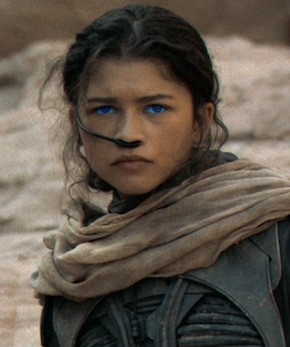
Chani is a fictional character featured in Frank Herbert's novels Dune (1965) and Dune Messiah (1969). Known mainly as the Fremen wife and legal concubine of protagonist Paul Atreides, Chani is the daughter of Imperial Planetologist Liet-Kynes and his Fremen wife Faroula, and later the mother of the twins Ghanima and Leto II Atreides. The character is later resurrected as a ghola, appearing in Hunters of Dune (2006) and Sandworms of Dune (2007), Brian Herbert and Kevin J. Anderson's novels which complete the original series.
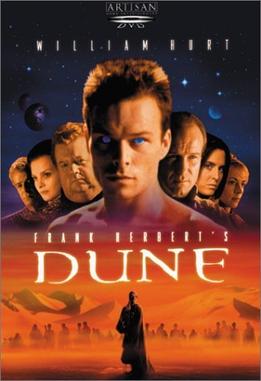
Frank Herbert's Dune is a 2000 science fiction television miniseries, based on the 1965 novel of the same title by Frank Herbert. It is written for the screen and directed by John Harrison, and stars Alec Newman as Paul Atreides, William Hurt as Duke Leto Atreides, and Saskia Reeves as Lady Jessica, along with Ian McNeice, Julie Cox, and Giancarlo Giannini. It was an international co-production between the American cable network Syfy, and companies in Germany, Canada, and Italy. This is the second overall filmed adaptation of Herbert’s novel, following the 1984 film directed by David Lynch, and preceding Denis Villeneuve’s two-part film adaptation.

Dune is an American science fiction media franchise that originated with the 1965 novel Dune by Frank Herbert and has continued to add new publications. Dune is frequently described as the best-selling science fiction novel in history. It won the inaugural Nebula Award for Best Novel and the Hugo Award in 1966 and was later adapted into a 1984 film, a 2000 television miniseries, and a two-part film series with the first film in 2021 and a sequel in 2024. Herbert wrote five sequels, the first two of which were concomitantly adapted as a 2003 miniseries. Dune has also inspired tabletop games and a series of video games. Since 2009, the names of planets from the Dune novels have been adopted for the real-world nomenclature of plains and other features on Saturn's moon Titan.

Dune is a 1992 adventure strategy game based on the 1965 novel of the same name by Frank Herbert. It was developed by Cryo Interactive and published by Virgin Interactive.

Cryo Interactive Entertainment was a French video game development and publishing company founded in 1990, but existing unofficially since 1989 as a developer group under the name Cryo. The company gained recognition for its adventure games, such as the commercially successful titles Dune, Dragon Lore and Atlantis: The Lost Tales, along with the racing series MegaRace.
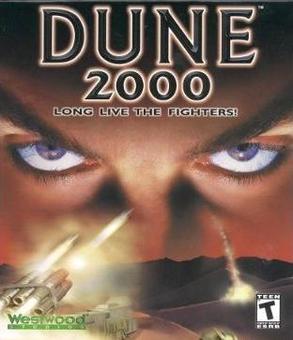
Dune 2000 is a real-time strategy video game, developed by Intelligent Games and published by Westwood Studios in 1998 for Microsoft Windows. It was later ported to the PlayStation in 1999. It is a partial remake of Dune II, which is loosely based on Frank Herbert's Dune universe. The story of the game is similar to Dune II, and is continued in Emperor: Battle for Dune.
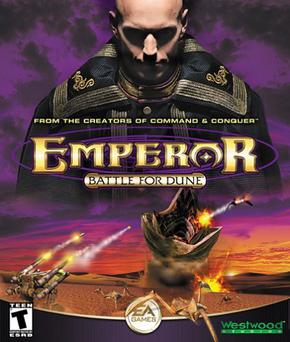
Emperor: Battle for Dune is a real-time strategy video game, released by Westwood Studios in June 2001. It is based in Frank Herbert's science fiction Dune universe. It follows its predecessors, Dune II and Dune 2000. While Dune II was a distinct story to that of Dune, and Dune 2000 was a remake of Dune II, Emperor: Battle for Dune is a direct sequel to the previous games. In particular, it is a sequel to Dune 2000, carrying on from where it left off, with several of the characters and actors returning. Like Dune 2000 and many of the other Westwood games that came before it, Emperor features live action cut scenes filmed with actors.
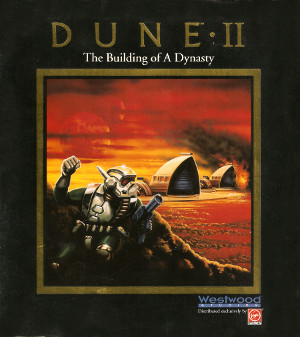
Dune II: The Building of a Dynasty is a 1992 real-time strategy game developed by Westwood Studios and published by Virgin Games. It serves as the sequel to Dune (1992).

Atlantis III: The New World,, is a 2001 fantasy adventure video game developed and published by Cryo Interactive, with Dreamcatcher Interactive publishing the game in North America. David Rhodes composed the musical score. It is the third game in the Atlantis series by Cryo, as well as the last one made before Cryo's closure. It was followed by Atlantis Evolution in 2004.

Paul of Dune is a 2008 science fiction novel written by Brian Herbert and Kevin J. Anderson, set in the Dune universe created by Frank Herbert. Released on September 16, 2008, it is the first book in the Heroes of Dune series and chronicles events between Frank Herbert's Dune (1965) and Dune Messiah (1969), as well as between Dune and its 2001 Brian Herbert/Kevin J. Anderson prequel, Dune: House Corrino.
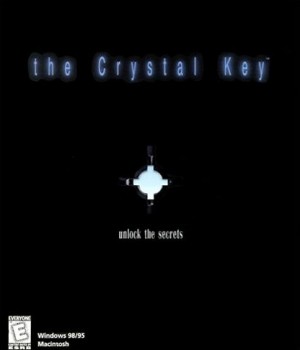
The Crystal Key is a 1999 graphic adventure video game developed by Earthlight Productions and published by DreamCatcher Interactive. A work of science fiction, it casts the player as an interstellar explorer on a quest to save Earth from Ozgar, a malevolent alien conqueror. The player uses portals to traverse multiple planets, including desert and jungle worlds, while collecting items and solving puzzles. The Crystal Key was conceived by John and Jennifer Matheson in the mid-1990s, and it underwent a five-year creation process hampered by problems with its technology. It was signed by DreamCatcher as part of the publisher's strategic push into the adventure game genre.


















